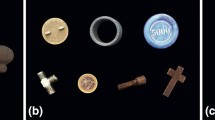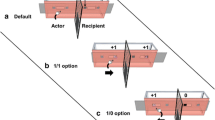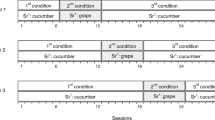Abstract
Although numerous studies have examined token-directed behaviors in primates, few have done so in a social context despite the fact that most primate species live in complex groups. Here, we provided capuchin monkeys with a relatively limited budget of tokens, likely to elicit intragroup competition, and, after an overnight delay, we allowed them to exchange tokens while in a group setting. We aimed to 1) evaluate whether social context affects token-directed behaviors of knowledgeable subjects, i.e., subjects already proficient in token exchange before the present study, as well as of naïve subjects, i.e., subjects that never showed exchange behavior before this study; 2) appraise whether capuchins indeed value tokens; and 3) assess whether capuchins can refrain from throwing tokens outside their enclosure when the experimenter is not present. Overall, the social context positively affected high-ranking individuals and negatively affected low-ranking ones. All 6 high-ranking naïve subjects, but none of the 4 low-ranking ones, quickly acquired token exchange behavior, whereas 9 of 12 low-ranking knowledgeable subjects, but only 1 high-ranking knowledgeable subject, never displayed token exchange in social contexts. Thus, competition constrained token exchange in low-ranking subjects and prompted exchange behavior in high-ranking naïve subjects. Capuchins were unable to inhibit the exchange of valueless items when the experimenter was soliciting them and, at the group level, knowledgeable subjects did not exchange more valuable tokens than less valuable (or valueless) ones. However, the 3 high-ranking knowledgeable subjects that exchanged most of the tokens first preferentially exchanged more valuable tokens over less valuable or valueless ones. Finally, capuchins inhibited exchange behavior in the absence of the experimenter, thus recognizing the appropriate conditions in which a successful exchange could occur.


Similar content being viewed by others
References
Addessi, E., Crescimbene, L., & Visalberghi, E. (2007). Do capuchin monkeys (Cebus apella) use tokens as symbols? Proceedings of the Royal Society of London B – Biological Sciences, 274, 2579–2585.
Addessi, E., Crescimbene, L., & Visalberghi, E. (2008a). Food and token quantity discrimination in capuchin monkeys (Cebus apella). Animal Cognition, 11, 275–282.
Addessi, E., Mancini, A., Crescimbene, L., Padoa-Schioppa, C., & Visalberghi, E. (2008b). Preference transitivity and symbolic representation in capuchin monkeys (Cebus apella). PloS ONE, 3, e2414. doi:10.1371/journal.pone.0002414.
Bandura, A. (1971). Analysis of social modeling processes. In A. Bandura (Ed.), Psychological modeling. Chicago: Aldine-Atherton.
Bandura, A. (1977). Social modeling theory. Chicago: Aldine-Atherton.
Bonnie, K. E., Horner, V., Whiten, A., & de Waal, F. B. M. (2007). Spread of arbitrary conventions among chimpanzees: a controlled experiment. Proceedings of the Royal Society of London B – Biological Sciences, 274, 367–372.
Brosnan, S., & de Waal, F. B. M. (2004). A concept of value during experimental exchange in brown capuchin monkeys, Cebus apella. Folia Primatologica, 75, 317–330.
Brosnan, S. F., & de Waal, F. B. M. (2005). Responses to a simple barter task in chimpanzees, Pan troglodytes. Primates, 46, 173–182.
Carpenter, C., & Locke, N. (1937). Notes on symbolic behavior in a cebus monkey (Capucinus appella). Journal of Genetic Psychology, 51, 267–278.
Chen, M. K., Lakshminarayanan, V., & Santos, R. (2006). How basic are behavioural biases? Evidence from capuchin monkeys trading behavior. Journal of Political Economy, 114, 517–537.
Cowles, J. (1937). Food-tokens as incentive for learning by chimpanzees. Comparative Psychology Monographs, 14, 1–96.
Deci, E. L., & Ryan, R. M. (1985). Intrinsic motivation and self-determination in human behavior. New York: Plenum.
Drea, C. M., & Wallen, K. (1999). Low-status monkeys “play dumb” when learning in mixed social groups. Proceedings of the National Academy of Sciences of the USA, 96, 12965–12969.
Dufour, V., & Sterck, E. H. M. (2008). Chimpanzees fail to plan in an exchange task but succeed in a tool-using procedure. Behavioural Processes, 79, 1927.
Dufour, V., Pelé, M., Sterck, E. H. M., & Thierry, B. (2007). Chimpanzee (Pan troglodytes) anticipation of food return: Coping with waiting time in an exchange task. Journal of Comparative Psychology, 121, 145–155.
Dufour, V., Pelé, M., Neumann, M., Thierry, B., & Call, J. (2009). Calculated reciprocity after all: computation behind token transfers in orang-utans. Biology Letters, 5, 172–175.
Ferreira, R. G., Lee, P., & Izar, P. (2008). Food competition in a semi-free-ranging Cebus apella group. Folia Primatologica, 79, 463–475.
Fragaszy, D., & Perry, S. (2003). The biology of traditions. Models and evidence. Cambridge: Cambridge University Press.
Fragaszy, D., & Visalberghi, E. (1990). Social processes affecting the appearance of innovative behaviors in capuchin monkeys. Folia Primatologica, 54, 155–165.
Fragaszy, D., & Visalberghi, E. (2004). Socially biased learning in monkeys. Learning & Behavior, 32, 24–35.
Fragaszy, D. M., Fedigan, L. M., & Visalberghi, E. (2004). The complete capuchin. The biology of the genus Cebus. Cambridge: Cambridge University Press.
Hare, B. (2001). Can competitive paradigms increase the validity of experiments on primate social cognition? Animal Cognition, 4, 269–280.
Hare, B., & Tomasello, M. (2004). Chimpanzees are more skilful in competitive rather than in cooperative tasks. Animal Behaviour, 68, 571–581.
Hare, B., Call, J., Agnetta, B., & Tomasello, M. (2000). Chimpanzees know what conspecifics do and do not see. Animal Behaviour, 59, 771–785.
Heyes, C. M., & Galef, B. G., Jr. (1996). Social learning in animals. The roots of culture. San Diego: Academic.
Janson, C. H. (1985). Aggressive competition and individual food consumption in wild brown capuchin monkeys (Cebus apella). Behavioral Ecology and Sociobiology, 18, 125–138.
Kelleher, R. T. (1956). Intermittent conditioned reinforcement in chimpanzees. Science, 124, 679680.
Kelleher, R. (1957a). A multiple schedule of conditioned reinforcement with chimpanzees. Psychological Reports, 3, 485–491.
Kelleher, R. (1957b). A comparison of conditioned and food reinforcement on a fixed-ratio schedule in chimpanzees. Psychology Newsletter, 8, 88–93.
Koenig, A., Beise, J., Chalise, M. K., & Ganzhorn, J. U. (1998). When females should contest for food: testing hypotheses about resource density, distribution, size, and quality with Hanuman langurs (Presbytis entellus). Behavioral Ecology and Sociobiology, 42, 225–237.
Lakshminaryanan, V., Chen, M. K., & Santos, L. R. (2008). Endowment effect in capuchin monkeys. Philosophical Transactions of the Royal Society B, 363, 3837–3844.
Lam, S., Yim, P., Law, J. S. F., & Cheung, R. W. Y. (2004). The effects of competition on achievement motivation in Chinese classrooms. British Journal of Educational Psychology, 74, 281–296.
Mowrer, O. H. (1950). Learning theory and personality dynamics. New York: Ronald.
Pepperberg, I. M. (1990). Conceptual abilities of some nonprimate species, with an emphasis on African Gray Parrot. In S. T. G. Parker & K. R. Gibson (Eds.), “Language” and intelligence in monkeys and apes (pp. 476–477). Cambridge: Cambridge University Press.
Ramseyer, A., Pelè, M., Dufour, V., Chauvin, C., & Thierry, B. (2006). Accepting loss: the temporal limits of reciprocity in brown capuchin monkeys. Proceedings of the Royal Society of London B – Biological Sciences, 273, 179184.
Schino, G. (2004). Birth sex ratio and social rank: consistency and variability within and between primate groups. Behavioral Ecology, 15, 850–856.
Silberberg, A., Crescimbene, L., Addessi, E., Anderson, J., & Visalberghi, E. (2009). Does inequity aversion depend on a frustration effect? A test with capuchin monkeys (Cebus apella). Animal Cognition, 12, 505–509.
Sousa, C., & Matsuzawa, T. (2001). The use of tokens as rewards and tools by chimpanzees (Pan troglodytes). Animal Cognition, 4, 213–221.
Spence, K. W. (1937). Experimental studies of learning and the mental processes in infra-human primates. Psychological Bulletin, 34, 806–850.
Thorpe, W. H. (1956). Learning and instinct in animals. London: Methuen.
Todt, D. (1975). Social learning of vocal patterns and models of their application in Gray parrots. Zeitschrift für Tierpsychologie, 39, 178–188.
Tomasello, M., & Call, J. (1997). Primate cognition. Oxford: Oxford University Press.
van Schaik, C. (1989). The ecology of social relationships amongst female primates. In V. Standen & R. Foley (Eds.), Comparative socioecology: The behavioural ecology of humans and other mammals (pp. 95–218). Oxford: Blackwell.
van Schaik, C. P., & van Noordwijk, M. A. (1988). Scramble and contest in feeding competition among female long-tailed macaques (Macaca fascicularis). Behaviour, 105, 77–98.
Verbeek, P., & de Waal, F. B. M. (1997). Postconflict behavior of captive brown capuchins in the presence and absence of attractive food. International Journal of Primatology, 18, 703–725.
Westergaard, G., Liv, C., Chavanne, T. J., & Suomi, S. (1998). Token-mediated tool-use by a tufted capuchin monkey (Cebus apella). Animal Cognition, 1, 101–106.
Westergaard, G., Liv, C., Rocca, A. M., Cleveland, A., & Suomi, S. (2004). Tufted capuchins (Cebus apella) attribute value to foods and tools during voluntary exchanges with humans. Animal Cognition, 7, 1924.
Wolfe, J. (1936). Effectiveness of token-rewards for chimpanzees. Comparative Psychology Monographs, 12, 1–72.
Acknowledgments
We thank Sabrina Rossi, Luigi Baciadonna, Luciana Massaro, Francesca De Petrillo, and Luigi Macchitella for helping with data collection; Valentina Truppa and Francesco Natale for statistical advice; and Brandon Wheeler for revising the English and providing useful comments. We especially thank Charles Snowdon and 2 anonymous referees for their thoughtful suggestions that greatly improved a previous version of the manuscript. We also thank the Bioparco SPA for hosting our Primate Centre and our keepers Massimiliano Bianchi and Simone Catarinacci. This work was funded by VI Framework, NEST Pathfinder Initiative “What It Means to Be Human,” Contract no. 29088; “Humans-The Analogy-Making Species” (ANALOGY); and by the European Science Foundation through the SOCCOP Project (The Social and Mental Dynamics of Cooperation) within the TECT Program (The Evolution of Cooperation and Trading). This study complied with protocols approved by the Italian Health Ministry, and all procedures were performed in full accordance with the European law on humane care and use of laboratory animals. The authors declare that they have no conflict of interest.
Author information
Authors and Affiliations
Corresponding author
Rights and permissions
About this article
Cite this article
Addessi, E., Mancini, A., Crescimbene, L. et al. How Social Context, Token Value, and Time Course Affect Token Exchange in Capuchin Monkeys (Cebus apella). Int J Primatol 32, 83–98 (2011). https://doi.org/10.1007/s10764-010-9440-4
Received:
Accepted:
Published:
Issue Date:
DOI: https://doi.org/10.1007/s10764-010-9440-4




